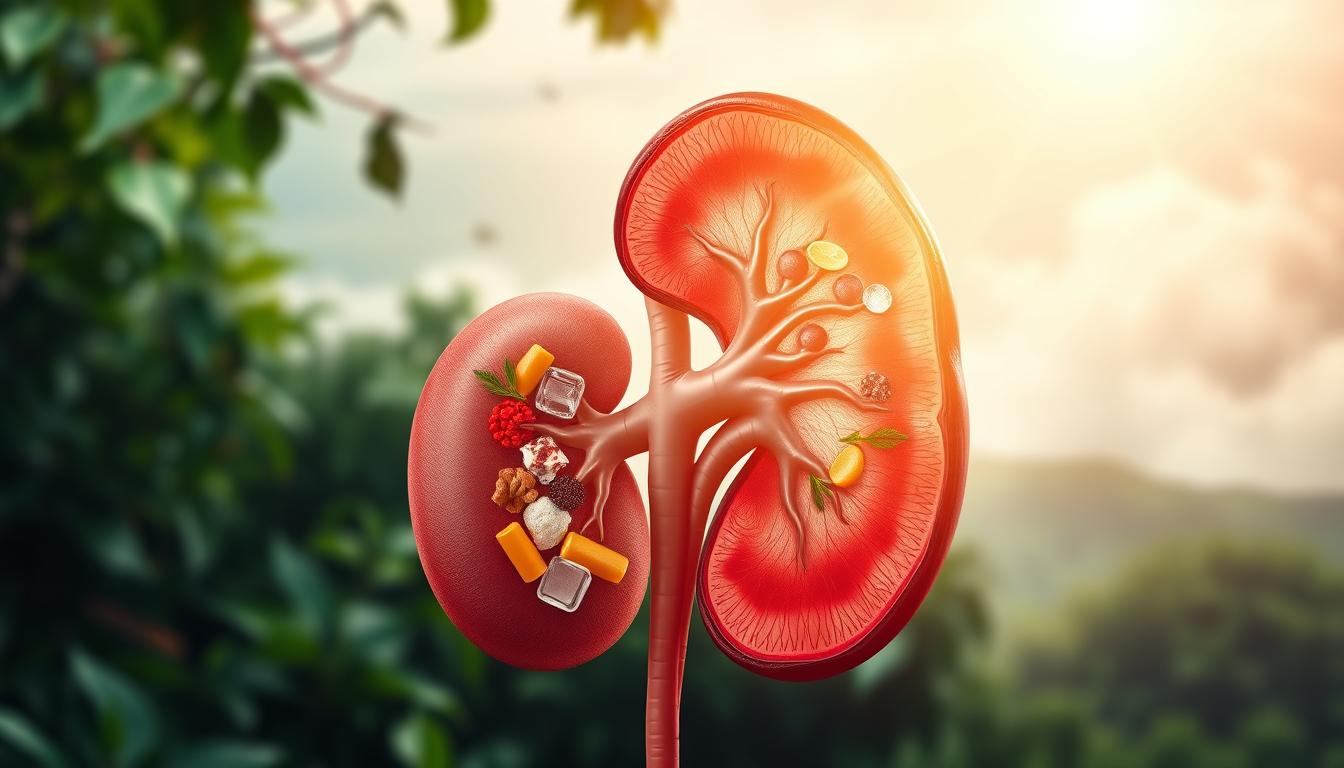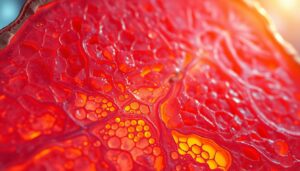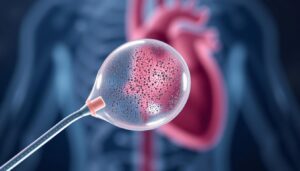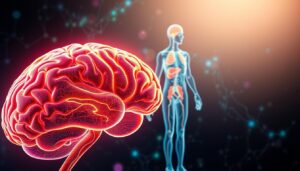Your kidneys are small but mighty, filtering 120-150 quarts of blood daily and producing about 1-2 quarts of urine each day1. These vital organs work tirelessly behind the scenes to regulate hormones and maintain your overall well-being. Despite their crucial role, many people overlook the importance of kidney health until issues arise.
Chronic kidney disease affects millions globally, with risk factors including diabetes, high blood pressure, obesity, and smoking1. High blood pressure is directly linked to chronic kidney disease, potentially leading to kidney failure if left unmanaged. Regular monitoring of blood pressure, aiming for less than 120/80 mmHg, is critical for maintaining kidney health1.
Tight regulation of blood sugar levels can reduce the risk of developing diabetic nephropathy by approximately 50%1. Elevated blood sugar levels significantly impair renal artery performance, increasing the risk of kidney damage1. Additionally, excessive protein intake can overwork the kidneys, necessitating moderation in dietary protein portions1. Regular moderate exercise helps manage blood sugar levels and reduce high blood pressure, both crucial for kidney health1. Smoking also increases the likelihood of developing kidney-related ailments1.
Early detection of kidney issues through regular testing can prevent the progression to end-stage renal disease, which may require dialysis or a kidney transplant1. Understanding your kidneys is key to long-term health management. This article provides a deep dive into kidney health essentials, exploring both anatomy and practical ways to protect these vital organs. Future sections will expand on clinical insights, lifestyle strategies, and the science behind kidney filtration.
Key Takeaways
- Kidneys filter 120-150 quarts of blood daily and produce 1-2 quarts of urine.
- Chronic kidney disease risk factors include diabetes, high blood pressure, obesity, and smoking.
- Regular blood pressure monitoring and tight blood sugar regulation are crucial for kidney health.
- Excessive protein intake and smoking can harm kidney function.
- Early detection of kidney issues can prevent progression to end-stage renal disease.
Understanding the Essential Role of Kidneys in Your Body
Your kidneys are vital organs that play a crucial role in maintaining your overall health. They work tirelessly to filter blood, remove waste products, and regulate essential nutrients. Each kidney contains about 1 million nephrons, the tiny units responsible for blood filtration2.
How Kidneys Filter and Balance Blood
The nephrons in your kidneys act like tiny filters, cleaning approximately 150 quarts of blood daily2. They remove waste products and excess substances, ensuring your blood remains balanced. This process is essential for maintaining proper electrolyte levels, such as sodium and potassium2.
The Impact of Kidneys on Overall Health
Healthy kidneys not only filter waste but also produce hormones that regulate blood pressure and support red blood cell production. Maintaining proper blood pressure is crucial for kidney function, with a normal reading being around 120/80 mmHg3. High blood pressure can lead to kidney damage over time.
Imagine your kidneys as vigilant cleaning factories, working continuously to keep your body healthy. They handle blood flow, waste removal, and nutrient balance, all of which are vital for your overall well-being. By understanding how your kidneys function, you can take steps to protect these essential organs and maintain optimal health.
Beyond the Bean Shape: A Deep Dive into Kidney Health Essentials
Kidneys are fascinating organs with a unique structure that goes beyond their bean-like appearance. Each kidney is equipped with approximately one million nephrons, the microscopic units responsible for filtering blood and reabsorbing essential nutrients4.
Exploring the Anatomy and Functions
The vascular system of the kidneys is intricate, featuring renal arteries that branch into smaller blood vessels. These vessels play a crucial role in the filtration process, ensuring that waste products are removed while preserving vital nutrients and red blood cells.
The process of reabsorption is critical for maintaining the body’s internal balance. Through this mechanism, essential substances like glucose, amino acids, and electrolytes are retained, ensuring proper bodily functions. This complex system highlights how each step of kidney function contributes to overall health.
| Component | Function | Importance |
|---|---|---|
| Nephrons | Filter blood, reabsorb nutrients | Essential for waste removal and nutrient retention |
| Renal Arteries | Supply blood to nephrons | Crucial for filtration process |
| Reabsorption | Retain essential nutrients | Maintains internal bodily balance |
Understanding the intricate functions of the kidneys provides valuable insights into both maintaining health and preventing disease. This knowledge empowers individuals to adopt lifestyles that support kidney function, promoting long-term well-being.
Recognizing and Managing Common Kidney Conditions
Kidney conditions can range from chronic to acute, each requiring different approaches to management. Understanding these differences is crucial for early detection and effective treatment.
Identifying Chronic Kidney Disease and Its Causes
Chronic kidney disease (CKD) develops slowly over time, often due to conditions like diabetes and high blood pressure5. These conditions damage the kidneys gradually, leading to a decline in function. CKD is categorized into five stages, with stage 5 being the most severe, requiring dialysis or a transplant.
Statistical data shows that about 35.5 million U.S. adults have kidney disease, with 90% unaware of their condition5. Diabetes is the leading cause of CKD, responsible for 2 out of 3 new cases of kidney failure5.
Acute Kidney Injury: Warning Signs and Immediate Actions
Acute kidney injury (AKI) occurs suddenly, often due to factors like dehydration or medication misuse. Symptoms include decreased urine output, swelling, and fatigue. Immediate medical attention is essential to prevent permanent damage.
Early detection of kidney issues can prevent progression to end-stage disease. Regular testing and biomarkers like serum creatinine levels help identify CKD and AKI early56.
Seeking prompt medical care is vital for AKI. Treatments may include fluid replacement or discontinuing harmful medications. Early intervention can significantly improve outcomes and prevent long-term damage.
Monitoring Kidney Health: What You Need to Know
Regular monitoring of kidney health is crucial for early detection and prevention of potential issues. By understanding key biomarkers and maintaining healthy habits, you can protect your kidneys and overall well-being.
Regular Testing and Biomarkers
Key biomarkers for kidney health include urine output and blood parameters like creatinine and BUN levels. These tests help assess how well your kidneys are functioning. Monitoring blood pressure and blood sugar levels is also vital, as high levels can damage kidney function over time7.
| Biomarker | Function | Importance |
|---|---|---|
| Urine Output | Measures kidney filtration rate | Indicates overall kidney function |
| Creatinine | Assesses kidney filtration efficiency | High levels may signal impaired function |
| BUN (Blood Urea Nitrogen) | Evaluates protein metabolism and kidney function | Helps diagnose acute or chronic issues |
Tracking subtle changes in kidney performance and adhering to personalized healthcare routines can significantly impact long-term health. Early detection through biomarkers can prevent severe damage, emphasizing the importance of regular check-ups8.
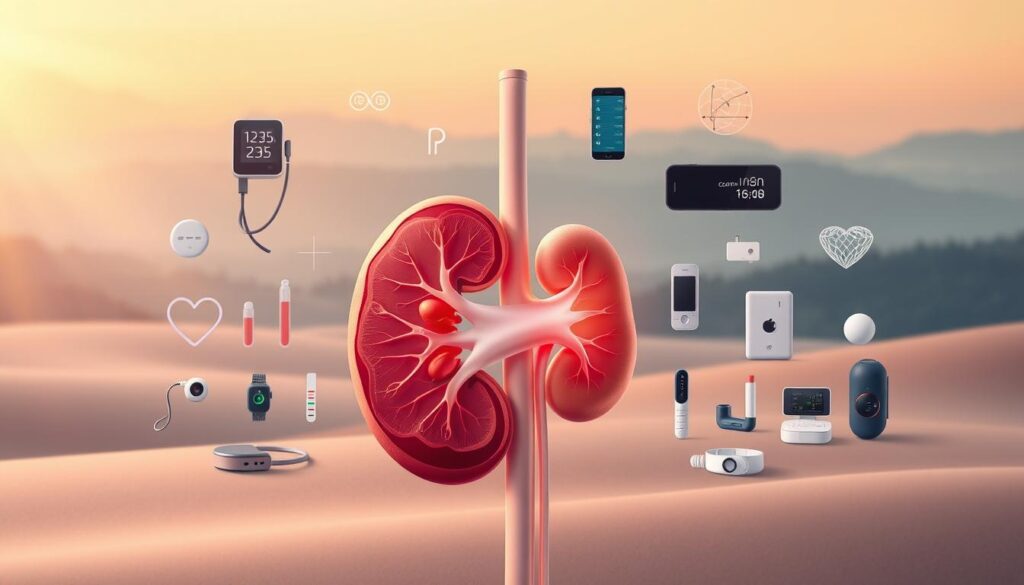
The Science Behind Kidney Filtration and Hormone Production
Kidney function is a complex process that involves both filtration and hormone production. These processes work together to maintain your body’s balance and overall health.
Understanding Nephrons and Glomerular Filtration
Nephrons, the tiny units within your kidneys, are responsible for filtering blood. This process begins with glomerular filtration, where water, ions, and small molecules pass through the glomerular membrane9. The glomerular filtration rate (GFR) typically ranges from 120 to 125 ml/min in healthy individuals10.
After filtration, the renal tubules reabsorb essential nutrients like glucose and amino acids. More than 50% of filtered water and molecules are reabsorbed by the proximal tubules9. This process ensures that only waste and excess substances are excreted in urine.
Hormone Regulation and Blood Pressure Control
Your kidneys produce hormones like renin and calcitriol, which help regulate blood pressure and calcium levels. Renin triggers the renin-angiotensin-aldosterone system, which tightens blood vessels and increases sodium retention, helping to control blood pressure9.
Additionally, the kidneys produce erythropoietin, which stimulates red blood cell production. This helps maintain healthy oxygen levels in your blood.
| Component | Function | Importance |
|---|---|---|
| Nephrons | Filter blood, reabsorb nutrients | Essential for waste removal and nutrient retention |
| Glomerular Filtration | Remove waste and excess substances | Maintains blood balance and prevents toxicity |
| Hormone Production | Regulate blood pressure and calcium levels | Supports overall cardiovascular and bone health |
Understanding how your kidneys filter blood and regulate hormones can help you appreciate their vital role in your health. By maintaining healthy kidneys, you support your overall well-being and prevent chronic conditions.
Clinical Trials and Cutting-Edge Research in Kidney Health
Recent advancements in medical research have opened new avenues for understanding and managing kidney health. Clinical trials are paving the way for innovative treatments and early detection methods, particularly in addressing the impact of high blood pressure and diabetes on kidney function.
Advances in Treatment and Prevention
Studies have shown that managing high blood pressure can significantly reduce the risk of kidney damage11. Similarly, controlling blood sugar levels in diabetic patients helps prevent complications like diabetic nephropathy. Researchers are also exploring new methods to support bone health and regulate potassium levels, which are crucial for overall kidney function11.
The Role of High Blood Pressure and Diabetes in Kidney Damage
High blood pressure and diabetes are leading causes of kidney disease. Over time, uncontrolled blood pressure can damage the blood vessels in the kidneys, impairing their ability to filter waste effectively. Similarly, diabetes can cause the nephrons to become overloaded, leading to potential kidney failure if left untreated11.
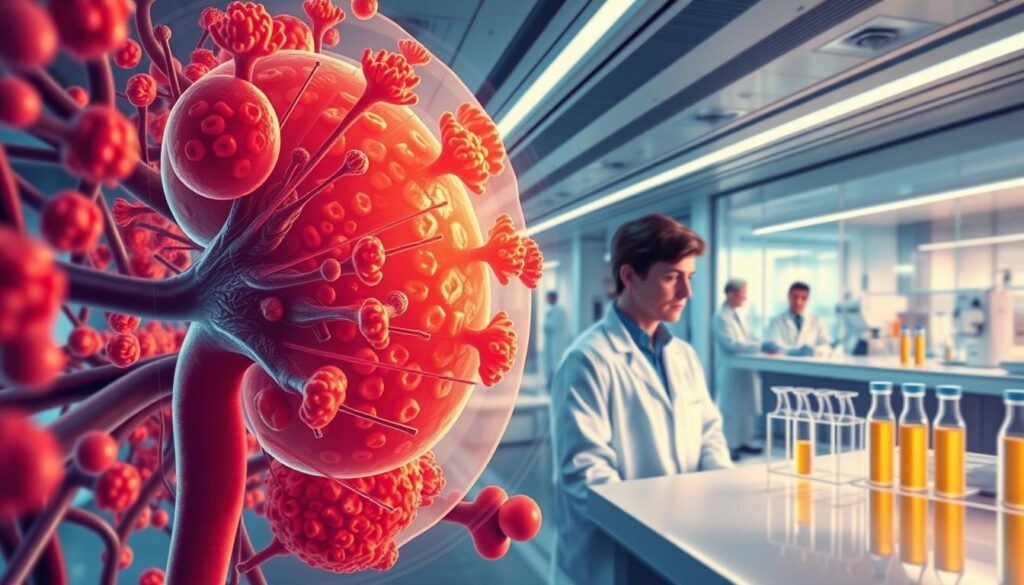
Continual research and personalized care are essential for improving kidney health outcomes. By addressing these factors early, individuals can better protect their kidneys and reduce the risk of chronic conditions.
Practical Strategies for a Kidney-Friendly Lifestyle
Adopting a kidney-friendly lifestyle is one of the most effective ways to protect your renal health and prevent conditions like kidney failure. By making informed dietary choices and staying active, you can significantly reduce the risk of kidney damage and maintain optimal function.
Dietary Choices and Hydration Tips
A balanced diet plays a crucial role in kidney health. Limiting sodium intake to less than 2,400 mg per day can help manage high blood pressure, a major risk factor for kidney damage12. Incorporating potassium-rich foods like leafy greens, but in moderation, is essential for those with kidney concerns. Drinking enough water is also vital—aim for at least eight glasses daily to help flush out toxins and prevent kidney stones13.
Incorporating Exercise and Stress Management
Regular physical activity, such as walking or swimming, can help control high blood pressure and blood sugar levels, both of which are critical for kidney health12. Managing stress through meditation or yoga can also support kidney function by reducing overall bodily strain. These small lifestyle adjustments can have a significant impact on long-term kidney health.
Conclusion
Protecting your kidneys is a vital step in maintaining overall well-being. As highlighted throughout this article, understanding kidney function and adopting proactive care can significantly improve long-term health outcomes. By staying informed and making conscious lifestyle choices, you can reduce the risk of acute kidney injury and manage daily kidney function effectively.
Clinical research underscores the importance of regular health trials and proper fluid intake. Drinking enough water helps flush out toxins, while monitoring biomarkers like creatinine levels ensures early detection of potential issues14. These steps are integral to preventing complications and maintaining optimal kidney function.
Embrace a kidney-friendly lifestyle by managing stress, staying active, and moderating your diet. Small adjustments can make a big difference. Remember, informed decisions today lead to better kidney health tomorrow. Take control of your well-being and stay proactive in protecting these essential organs.
FAQ
What are the main causes of chronic kidney disease (CKD)?
How does high blood pressure affect kidney function?
What role do kidneys play in maintaining healthy blood sugar levels?
What are the early signs of acute kidney injury?
How often should I get my kidney function tested?
Can a high-sodium diet directly harm kidney function?
How does diabetes impact kidney health?
What are the benefits of staying hydrated for kidney health?
Can exercise improve kidney function?
How does kidney function impact overall health?
Source Links
- Boost Your Kidney Function and Health: Essential Tips – https://drhuldaclark.org/boost-your-kidney-function-and-health-essential-tips/
- Kidney – https://en.wikipedia.org/wiki/Kidney
- Kidney Health Blood Tests: Decode Your Results – https://trtl.health/blogs/news/kidney-health-blood-tests?srsltid=AfmBOops2PYjoObcj8tqs0HlUv_eufzq-4Qpwtpmg5aXM2VzG89DvP42
- 8 Ways to Strengthen the Kidneys – https://branchbasics.com/blogs/healthy-living/8-ways-to-strengthen-the-kidneys?srsltid=AfmBOooh2vKCz7oDMrDDjEcLDWxUTqSCq1ngUCe5629UFUlUvFexSDj8
- Kidney Disease: Fact Sheet – https://www.kidney.org/about/kidney-disease-fact-sheet
- Health-related patterns and chronic kidney disease in the Brazilian population: National Health Survey, 2019 – https://pmc.ncbi.nlm.nih.gov/articles/PMC10117670/
- How to Choose the Right Kidney Specialist | KHC – https://khccares.com/blog/how-to-choose-the-right-kidney-specialist/
- 5 Golden Rules for Maintaining Healthy Kidneys | Essential Tips – https://www.apollodialysis.com/blog/5-golden-rules-to-keep-your-kidneys-healthy/
- Kidney histology – https://www.kenhub.com/en/library/anatomy/kidney-histology
- Physiology, Renal – StatPearls – NCBI Bookshelf – https://www.ncbi.nlm.nih.gov/books/NBK538339/
- Training – Nephrology – https://www.uab.edu/medicine/nephrology/research/cardio-renal-physiology-and-medicine/training
- The Renal Diet: Foods to Eat & Avoid in Kidney Disease – SelfDecode Health – https://health.selfdecode.com/blog/the-renal-diet/
- Kidney Stones 101 Comprehensive Guide | Healthy Keto™ Dr. Berg – https://www.drberg.com/blog/kidney-stones-101-comprehensive-guide
- What Are the Functions of the Kidneys? – https://www.drbismah.com/what-are-the-functions-of-the-kidneys/

